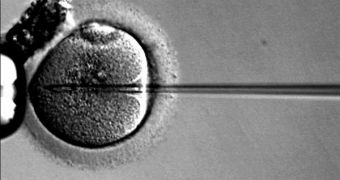Infertility experts say that children born through in-vitro fertilization may in fact be at risk of developing health problems later on in life. However, they mention, the idea cannot be tested at this point, seeing how the oldest of the individuals born after applying this method are in their 30s, whereas the vast majority are in their 20s. Scientists say that this young age does not yet allow them to gage the effects that IVF may have on their health in their long-run. A conference on the issue was recently held in San Diego, at the annual meeting of the American Association for the Advancement of Science.
“By and large, the kids are just fine. It's not like the kids have extra arms or extra heads or anything,” says Temple University geneticist Carmen Sapienza, quoted by ScienceNow. Experts are concerned about IVF babies for a variety of reasons. One of them is the fact that most children conceived through this method have rather low body weight at the time of birth. Unlike babies conceived naturally, IVF children tend to have less than 2.5 kilograms when they are born. This reduced level of weight is sometimes equal to that exhibited by premature babies, scientists say. What's also concerning is the fact that the same problem appears even when a single child is born, and not only when twins are born.
Generally, children who are born with a low weight at birth tend to experience long-term health problems, such as for example developing diabetes, heart conditions, hypertension, and so on. But these problems normally occur when the individual exceeds the age of 50, and so possible statistical correlations between IVF children and long-term health effects cannot yet be derived from meaningful data. In order to bridge this gap, Sapienza and her colleagues looked at the genes that may play a role in these diseases later on in life, including those who regulate insulin production and the metabolism. The study was designed as a comparison between children conceived naturally and those produced through artificial fertilization.
The team discovered that in about 5 to 10 percent of the genes analyzed the DNA methylation patterns were different between the two groups. These patterns dictate the manner in which genes are expressed. The science group says that it's not clear at this point whether the problem stems from the technology that is employed in IVF, or from the underlying condition that the parents have, which make them sterile in the first place. More research is also needed in understanding whether these differences will translate in more health problems later on in life, or in similar risks as any other individual.

 14 DAY TRIAL //
14 DAY TRIAL //